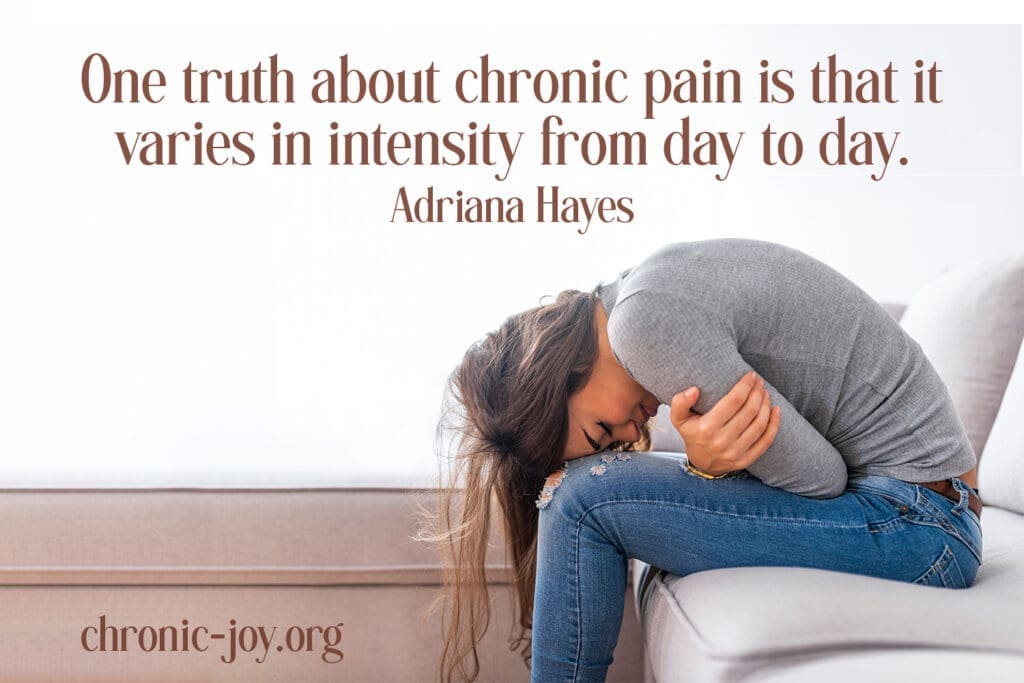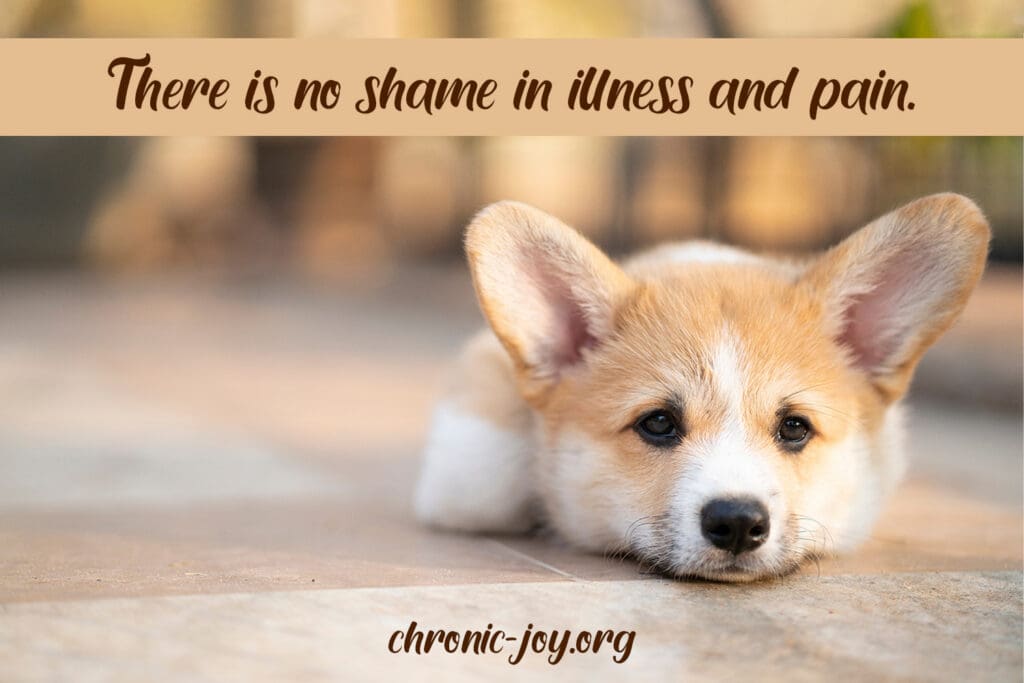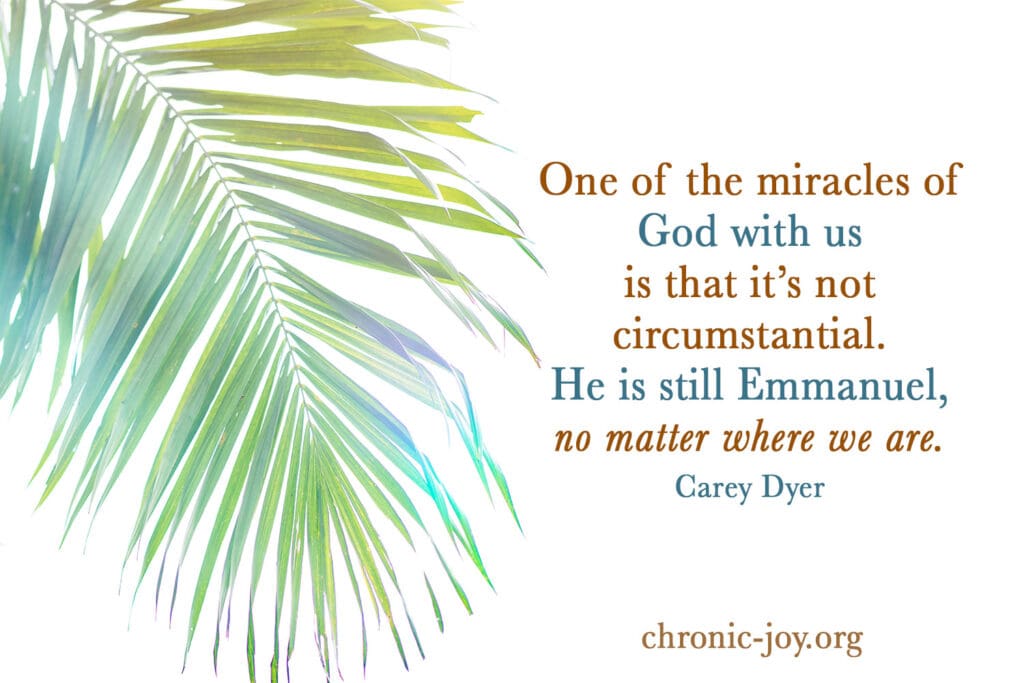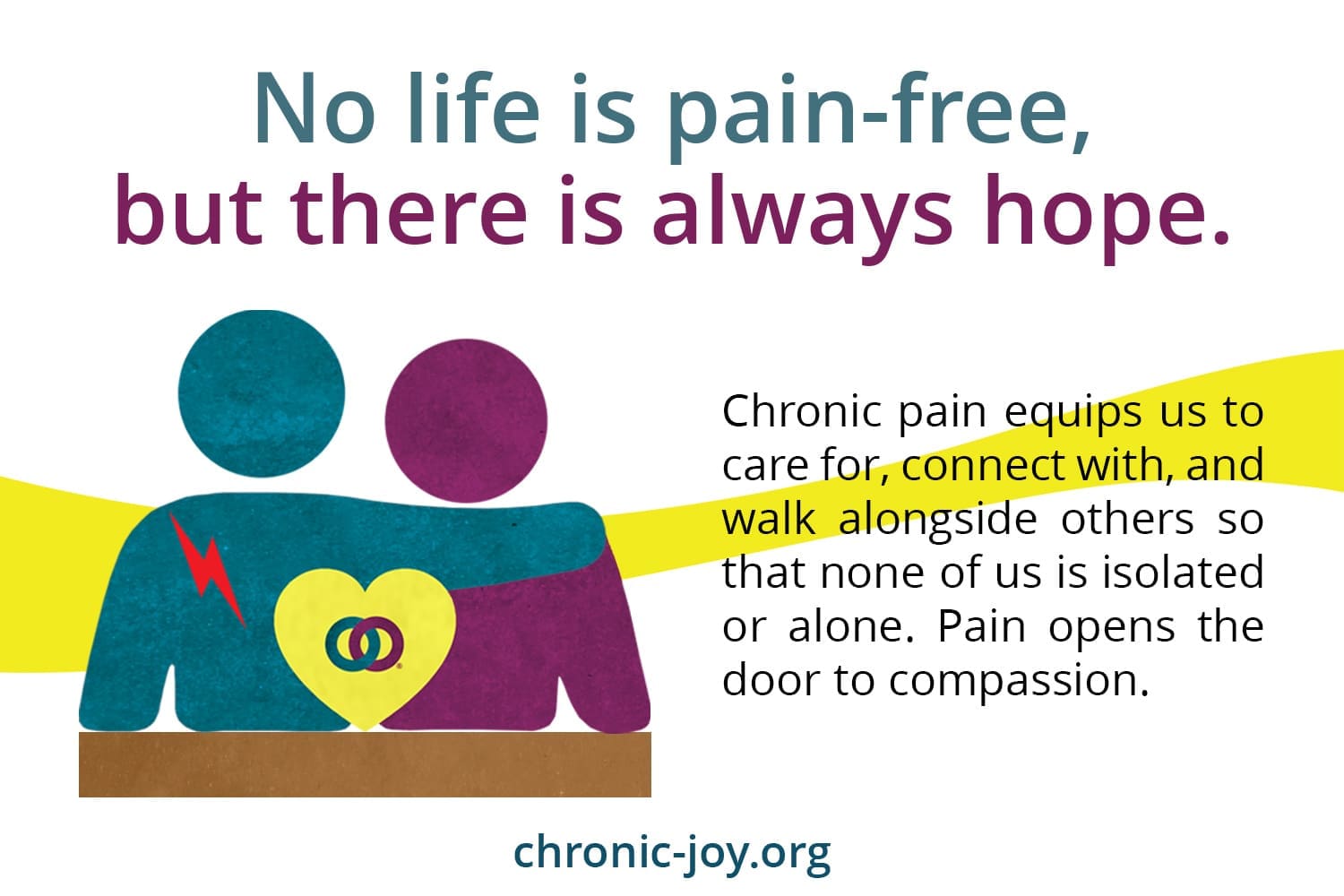
No Life Is Pain-Free.
But There Is Always Hope.
Pain equips us to care for, connect with, and walk alongside others so that we are not isolated or alone. Chronic pain opens the door to compassion.
Now, I’m sure of this: the sufferings we endure now are not even worth comparing to the glory that is coming and will be revealed in us. (Romans 8:18)
Pain is a powerful thing. It can strip away the masks we wear, leaving us vulnerable and uncertain and causing us to avoid interactions, cancel invitations, and (over time) withdraw from those we know and love.
Pain can be all-consuming, yet it cannot extinguish hope. In 2 Corinthians 4:8, the apostle Paul wrote: We are afflicted in every way, but not crushed ...
We will all suffer and experience pain, but we can rest in the confidence that God is allowing it for a greater purpose (Romans 8:28). What a wonderful thought that one day, we will be freed from pain forever (Revelation 21:4)!
We live in a broken, fallen world with broken, fallen people who do broken, fallen things … Multiply that brokenness and fallenness by eight billion people, and you have a massive, incalculable amount of pain and heartache that can have a powerful, humbling effect on us. (Pastor Ben Young)
Envelope of Hope
REQUEST your chronic pain resources.
Limit one – US, CA & UK.
7 Ways to Grow through Pain
1. BE PRESENT
Presence is the sacrificial willingness to be with each other in our pain. Being present is more important than words, beyond the need to fix it, and offers a life-giving space to share our pain stories. In the deepest trenches of pain, in the face of seemingly senseless suffering, in the darkest nights of despair, Jesus is with us.
2. CRY OUT TO GOD
Chronic pain is often beyond our capacity to alleviate, but it is never beyond God’s. From the depths of pain, we cry out to Him, knowing nothing is beyond His sight, out of His hands, or above His authority.
Through pain, we learn to be tender-hearted, listen intently and patiently, offer a hug, or sit with someone in silence. Walking with one another through our pain invites us to see life from a different perspective. God’s Spirit is in us and with us. It is His strength that others are drawn to through our pain and weakness.
3. SHIFT FOCUS FROM “PROBLEM“ TO “PRIVILEGE“
Pain requires us to shift focus, looking through a smaller lens as there is little else we can manage. This lens shows us what living fully present in each moment looks like. When we accept that invitation, we encounter God and experience His love in a new way. As life slows and expectations cease, an unexpected peace can be found. What if pain is a privilege rather than a problem? What if living fully present is only possible as we walk through the doorway of pain?
4. REJOICE IN PAIN (Really?)
Not only that, but we rejoice in our sufferings, knowing that suffering produces endurance, and endurance produces character, and character produces hope, and hope does not put us to shame… (Romans 5:3-4).
Through pain, God chisels away at the things we cling to, strengthening our endurance, refining our character, and deeply rooting our hope and trust in Him. What if it’s only through pain that we discover true joy?
I have told you this so that my joy may be in you and that your joy may be complete. (John 15:11)
5. DISCOVER BEAUTY
We can find great beauty in the crucible of suffering. Beauty and pain are mirror images. In tenderness, God is refining us into who He created us to be before we were born into this broken and hurting world. Yet, to discover the beauty, we must first surrender to the pain.
6. TELL THE STORY
Sometimes, things must be undone, unraveled, or torn down for God’s best to be purposed, built up, or birthed in us. Scars tell the stories of our pain—wounds that will one day reveal the breathtaking beauty of His love.
7. GROW DEEPER WITH GOD
What if pain invites God to step into our weakness and replace it with His strength? Pain can sink our roots deeper into Jesus.
What if pain facilitates a deeper understanding of who God is? Vaneetha Risner writes, “Through pain, God has ushered me into the fullest, most intimate, most sacred encounters with Him.”
A FEW IMPORTANT PAIN DONT’S
- Don’t encourage those in pain to think positively.
- Don’t offer unsolicited advice.
- Don’t discount or diminish anyone’s pain.
- Don’t trivialize pain by saying others have it worse or it could be much more difficult.
- Don’t try to fix anyone’s pain.
“I’ve been humbled again and again watching my wife (after years of chronic pain) selflessly serve other sufferers behind the scenes. She has always been compassionate, but through her suffering, she is now always moving toward others’ suffering because she knows the pain and the struggles. She knows when to encourage. She knows when to simply groan with someone. God has comforted her so that she can comfort others. It is all His grace in her pain. It is all His strength in her weakness. He deserves all the glory, and yet He still means to use her to accomplish His purpose of comforting others.” (Dave Zuleger)

Praying Through Chronic Pain
Chronic pain can be difficult and unyielding, causing us to feel overwhelmed, misunderstood, and sometimes even desperate. When words are few, let these prayers and questions guide you into the presence of God, where you are known, seen, and loved completely.
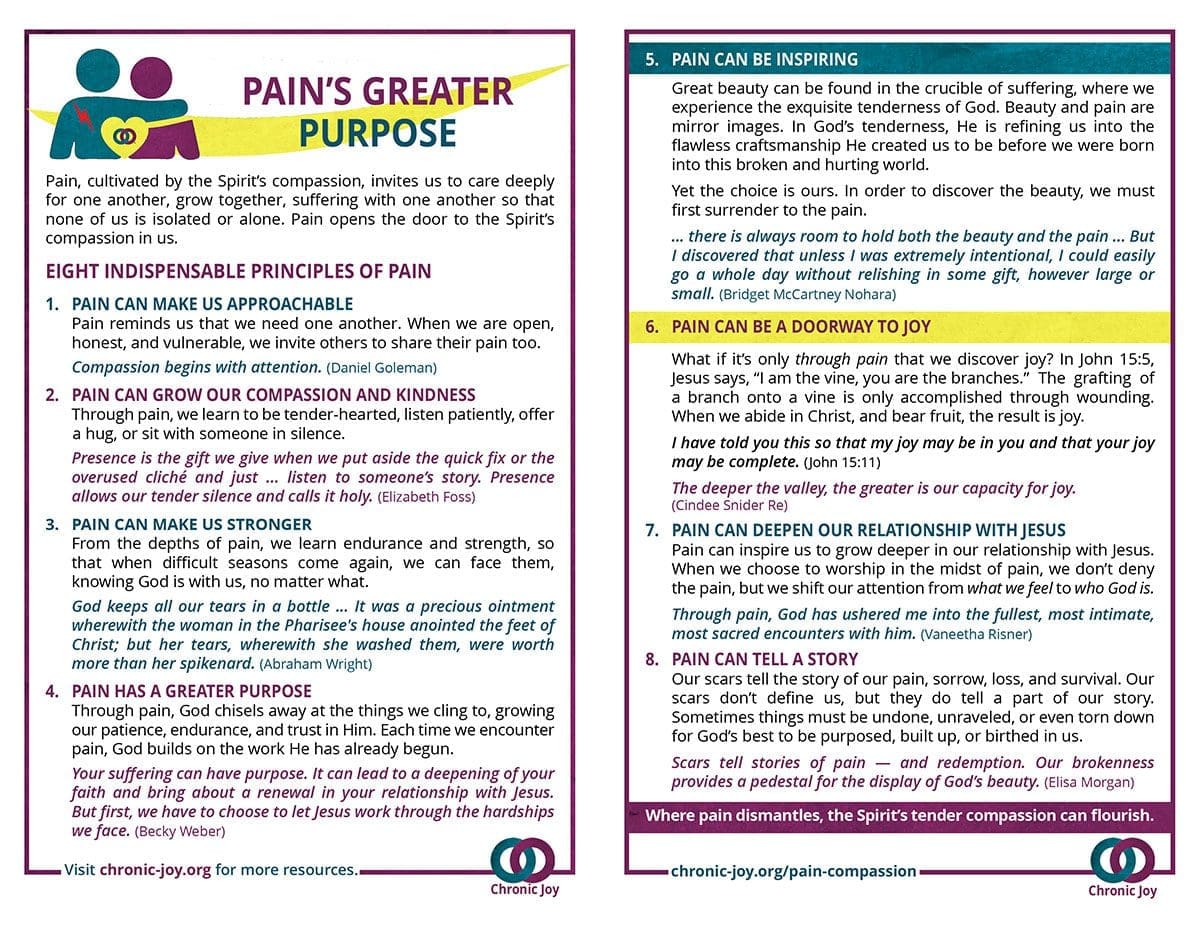
Pain's Greater Purpose
Pain, cultivated by the Spirit’s compassion, invites us to care deeply, grow together, and suffer with one another so that none of us is isolated or alone. Pain opens the door to the Spirit’s compassion in us.
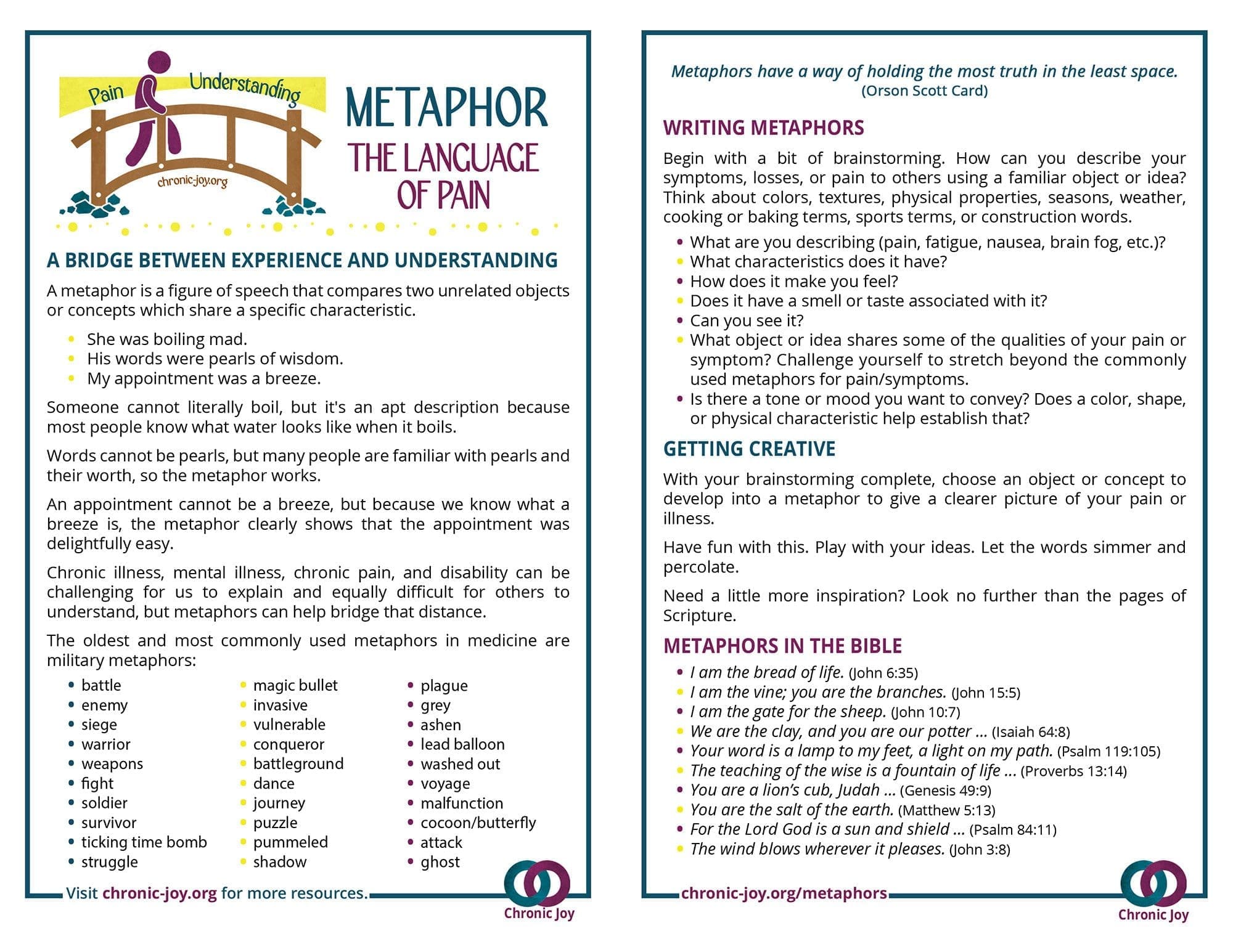
Metaphor • The Language of Pain
Chronic illness, mental illness, chronic pain, and disability can be challenging for us to explain and equally difficult for others to understand, but metaphor can help bridge that distance.
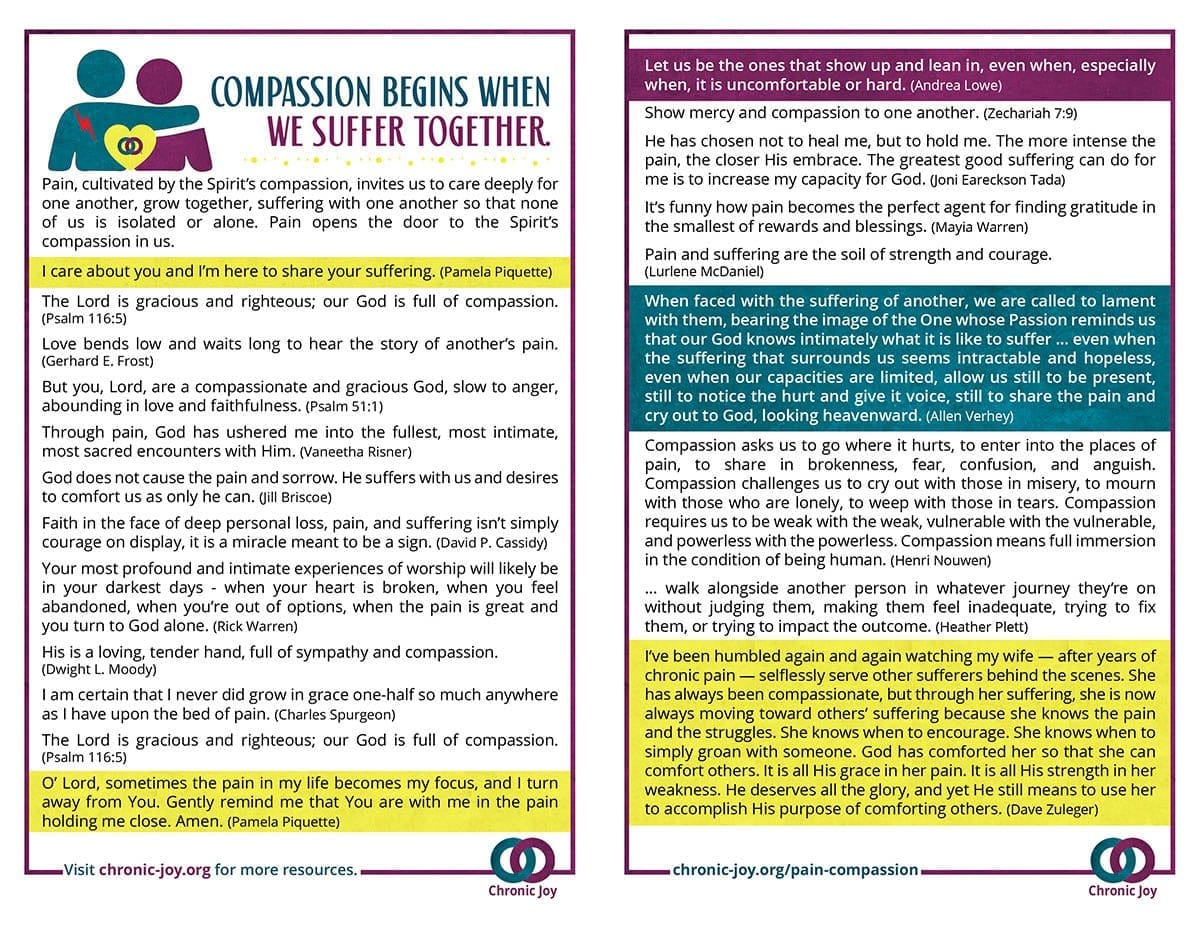
Compassion Begins When We Suffer Together
Pain, cultivated by the Spirit’s compassion, invites us to care deeply, grow together, and suffer with one another so that none of us is isolated or alone. Pain opens the door to the Spirit’s compassion in us.
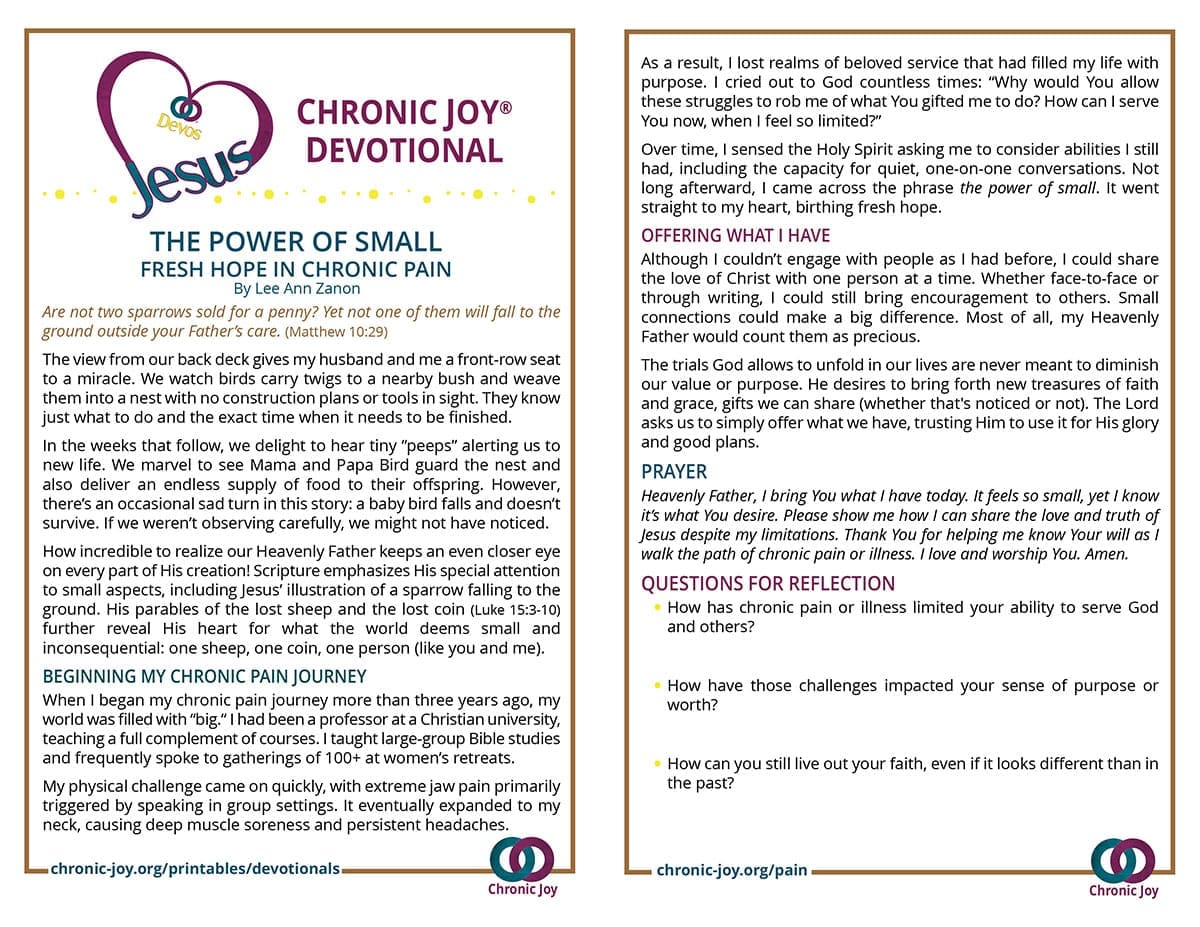
The Power of Small • Fresh Hope in Chronic Pain
Never underestimate the power of small. God desires to bring forth new treasures of faith and grace, gifts we can share (whether that's noticed or not).
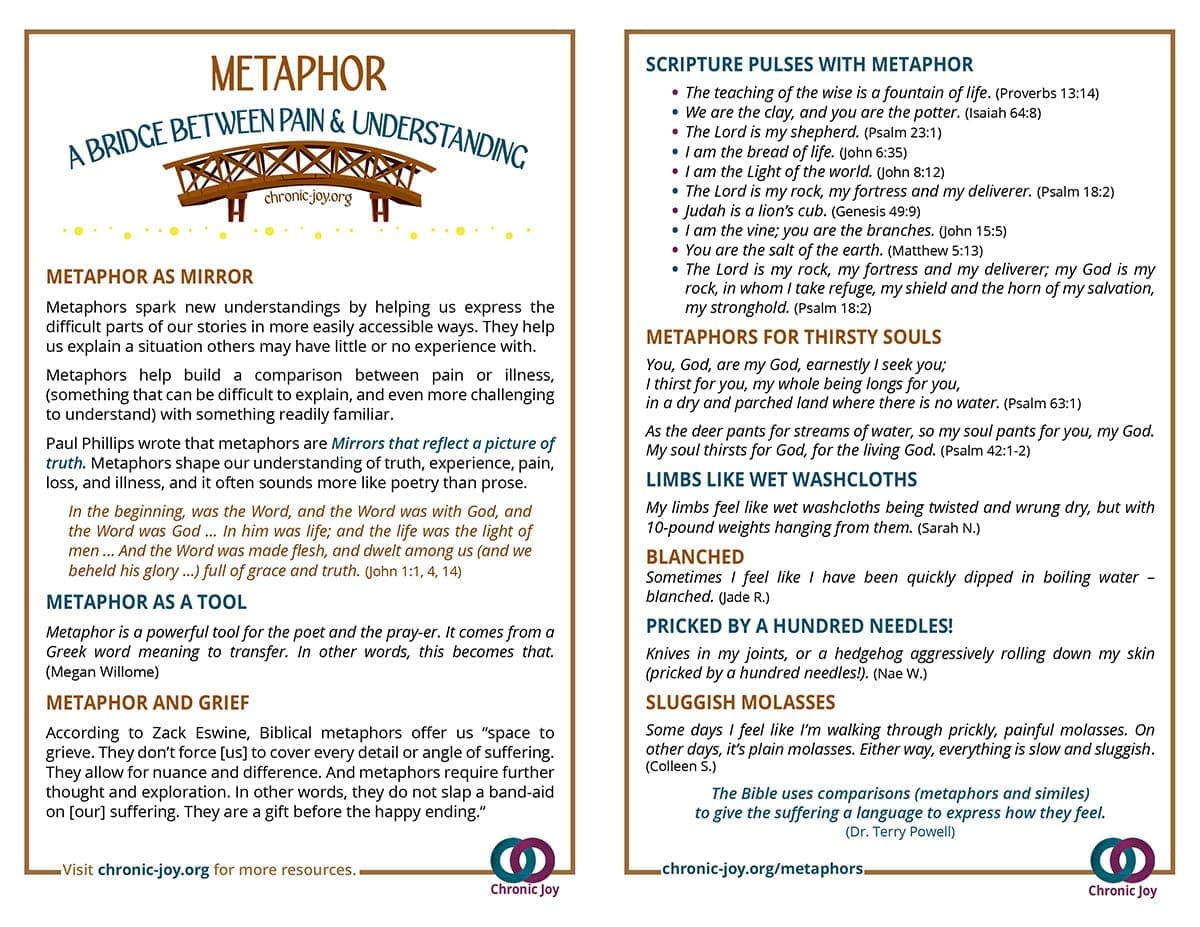
Metaphor • A Bridge Between Pain & Understanding
Metaphors spark new understandings by helping us express the difficult parts of our stories in more easily accessible ways. They also help us explain a situation others may have little or no experience with.
Posts
Living Well When It Hurts
As believers in Jesus Christ, we know that God can use even the worst circumstances in our life for good and our sinfulness doesn’t have to define us! Living well when it hurts is possible in Christ.
The Shame of Chronic Illness and Pain
I am speaking out my shame in chronic illness so that it can no longer chain me with its lies. ... shame has taken up in my thoughts, so that we can tear down its stronghold.
Embrace the Melancholy
So, I’ve decided to do something this season that I want to encourage you to do as well if you are so inclined: embrace the melancholy.
BOOKS WE LOVE
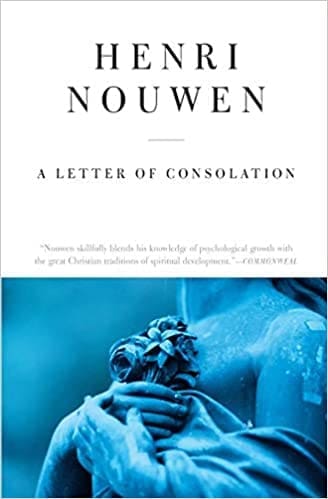
A Letter of Consolation
Henri J.M. Nouwen
This moving meditation is dedicated to “all those who suffer the pain that death can bring and who search for new life.” Written as a long letter to his father after the death of his mother, Nouwen reflects on the spiritual significance of death and life. This is a book to pass on to anyone who is going through a period of grief after loss.
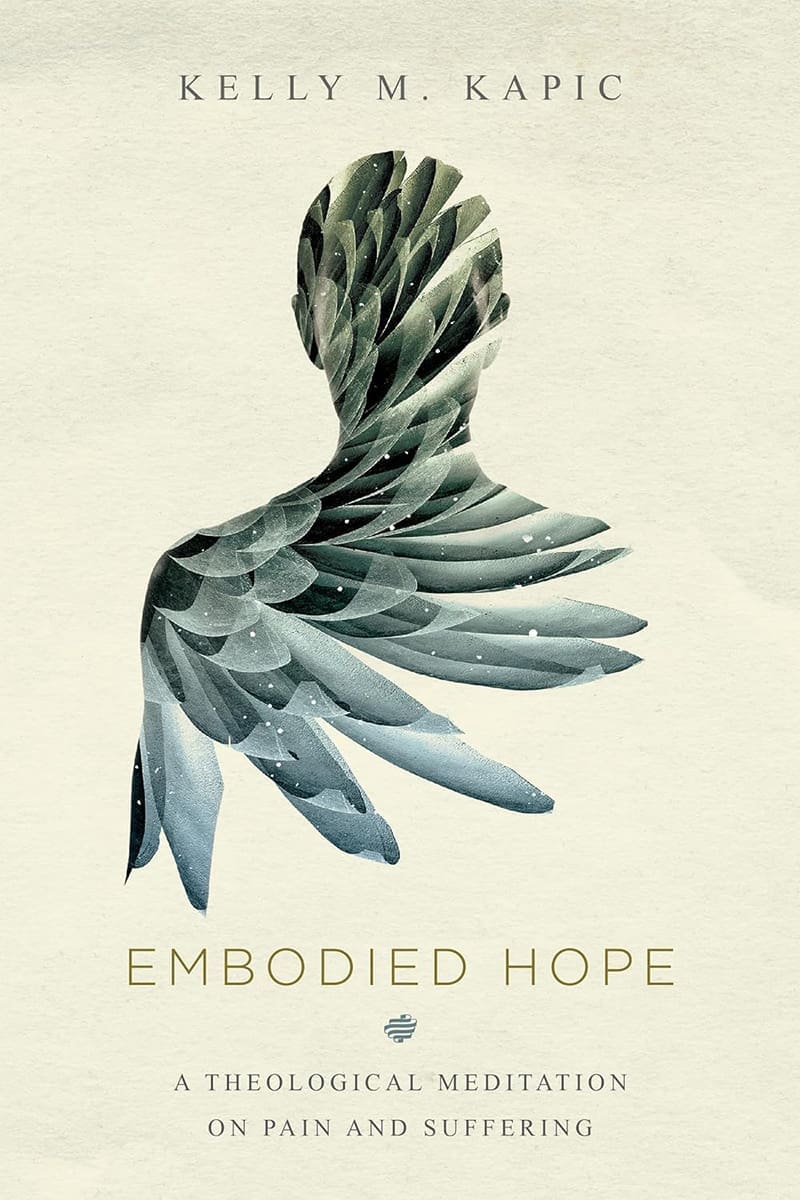
Embodied Hope: A Theological Meditation on Pain and Suffering
Kelly Kapic
Too often, the Christian attitude toward suffering is characterized by a detached academic appeal to God’s sovereignty, as if suffering were a game or a math problem. Maybe we expect that since God is good, everything will just work out all right somehow. Where, then, is honest lament? Aren’t we shortchanging believers of the riches of the Christian teaching about suffering?
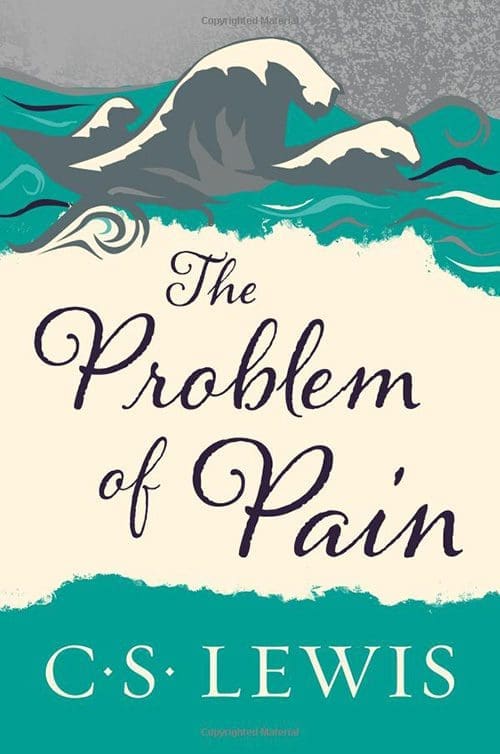
The Problem with Pain
C.S. Lewis
“If God is good and all-powerful, why does he allow his creatures to suffer pain?” With his signature wealth of compassion and insight, C.S. Lewis offers answers to this and other crucial questions. Further, he shares his hope and wisdom to help heal a world hungry for a true understanding of human nature.
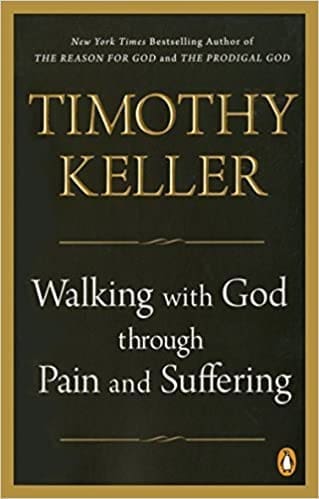
Walking with God through Pain and Suffering
Timothy Keller
The question of why God would allow pain and suffering in the world has vexed believers and nonbelievers for millennia. This book shows that there is meaning and reason behind our pain and suffering. Keller uses biblical wisdom and personal stories of overcoming adversity to make a forceful and ground-breaking case that this essential part of the human experience can be overcome only by understanding our relationship with God.

